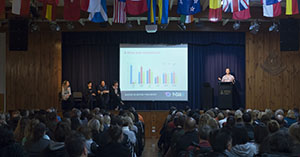Did you know 97 per cent of Australian homes with children have computer games?
A few years ago, a Russian teenager addicted to online gaming died after developing suspected deep-vein thrombosis. The 17-year-old had spent 22 consecutive days playing popular online game Defense of the Ancients.
He collapsed and died after developing a thrombosis, like those that passengers can suffer on long-haul flights. In the 18 months leading up to his death, investigators say the teenager spent about 6.5 hours a day playing online. During the days preceding his death, he had broken away from his computer screen only to eat and nap.
While this case may seem extreme, online games present another potential challenge for teenagers and parents, who need to become familiar with what their child is playing online, and with whom they are playing.
A 2018 report from the Office of the eSafety Commissioner found eight in 10 young people aged eight to 17 played games online in the 12 months to June 2017. The same report found online multiplayer gaming is very popular, with six in 10 young people playing these games.
Many online games include content and themes unsuitable for certain age groups. So games often come with age recommendations or ratings, similar to movie or film classifications. For example, Call of Duty (CoD) has an MA 15+ rating and contains strong themes and violence. Clash of Clans, a multiplayer game, is recommended for players over the age of 13.
Many games allow players to communicate through forums, chat and messaging services. In the interests of player safety, Activision, creators of CoD, recommend young people never share their password or give players they meet online their name, address, email address or school details. Computers and tablets should also have up-to-date security software to protect against viruses.
Supercell, owner of Clash of Clans, does not pre-screen or monitor all user content and recommends that players never share their login data or log into their account on someone else’s device.
Parents should also be aware that some games allow players to purchase points, different versions of the game and game-related merchandise. The Office of the eSafety Commissioner found around 34 per cent of eight to 17-year-olds made an in-game purchase in the 12 months to June 2017. So find out whether your child is using money to play online.
The Office of the eSafety Commissioner lists a number of games and has comprehensive information on game content, who can play, how to protect personal information, how to report cyber-bullying or abuse and how to block your child spending money while playing online.
Go to // www.esafety.gov.au/esafety-information/games-apps-and-social-networking // www.videogames.org.au // www.instituteofgames.com
Watch // www.abc.net.au/7.30/content/2015/s4472277.htm
RISK FACTORS
• Withdrawn
• Nightmares
• Loss of interest
• Online friends vs real friends
•Anger about not being able to play
WHY KIDS ARE HOOKED ON FORTNITE
This game has been one of the most popular video games for children and young people in recent times.
The free version, Fortnite: Battle Royale, operates across Windows and Mac, Xbox and PlayStation. However, while the game itself is free, players can
purchase outfits, weapons and other accessories to boost their chances of survival.
Fortnite pits players against other players around the world and the aim is to be the last person standing on a sometimes violent and hostile island
inhabited by monsters and enemy figures.
On average, each game can last around 20 minutes, assuming your character doesn’t get killed before that.
The Australian Council on Children and the Media says Fortnite is not recommended for children 12 years and under. Parental guidance is recommended
for children aged 13 to 17.
AT A GLANCE
GAMING AND YOUNG PEOPLE: A SNAPSHOT
76% of children under 18 play video games.
60% of parents play online games with their children in the same room.
81% of parents are familiar with controls on online games.
84% of parents say they have discussed playing safely online with their children.
48% of parents say they play online games with their children as a way of spending time with them.
77% of parents say they have rules about how long children can play games.
76% of parents have rules about games their child can play.
Digital Australia Report 2018 by Interactive Games & Entertainment Association




